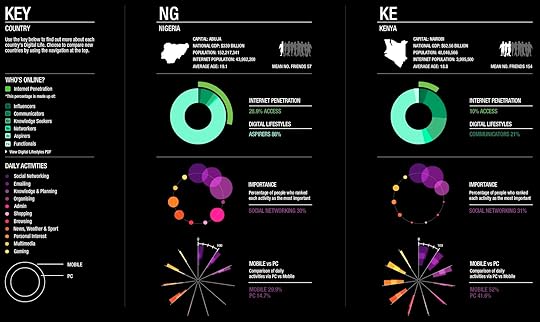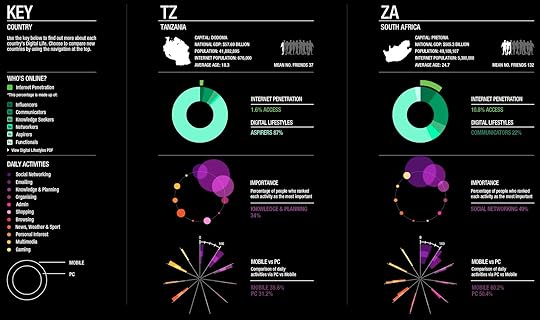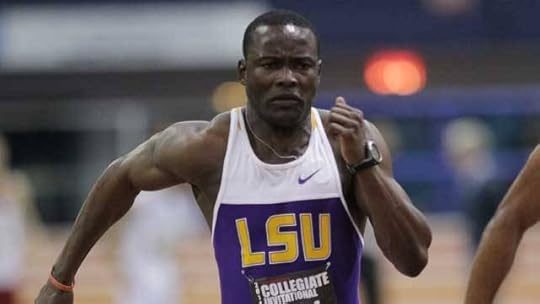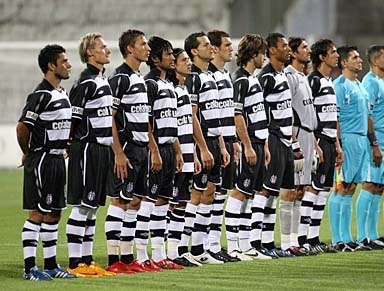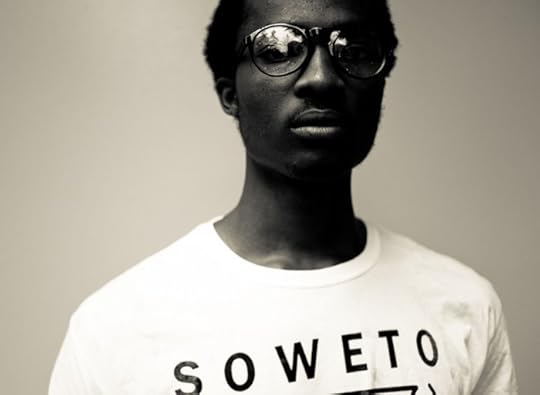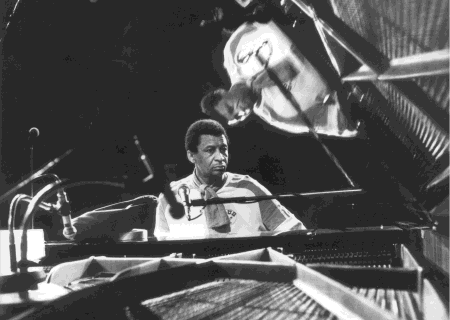Sean Jacobs's Blog, page 647
May 13, 2011
Reading List
It's the last week of classes here at The New School, so it's crazy around here. No time for detailed posts, so here is a run down of things that should have gotten proper treatment, but only gets a few lines.
First up is the new film "The First Grader" (trailer above) about a 84 Kenyan man's quest to go to school opened this week. From the trailer or the reviews it seems the film ditched the required benign white American or European character. Some reviews from The Los Angeles Times and The New York Times's some reviews.
The National Journal, after consulting with political operatives in the US capital, conclude that Irish pop singer Bono is apparently "the most politically effective celebrity of all time." And don't get cynical now:
Several factors explain this shift. The intense polarization of American politics probably encourages celebrities to focus on international issues that don't divide their audiences as sharply. "There's hardly a person who is going to blame you for going to Uganda; those issues don't have any political downside," says Lara Bergthold, who has organized celebrities for liberal causes since the 1980s. Further, as the entertainment industry has grown more global, so has the incentive for stars to pursue global causes, notes Craig Minassian, a former HBO producer who consults with the Clinton Global Initiative (and who also recently produced Jon Stewart's Rally to Restore Sanity). "To the extent they are addressing issues that are important in Africa or Asia, it also helps them from a global-brand perspective," he points out. Both Bergthold and Minassian note that involvement in development issues also provides stars with more-tangible evidence of effectiveness for the time they commit. "[Fighting] cancer feels like you never get over the hump, but you really can get clean water to 1,000 villagers in Malawi," Minassian says.
Via Digital Life "the most comprehensive study of the African digital consumer" in Nigeria, Kenya, Tanzania, and South Africa. Here
It's the Cannes Film Festival this week and the next and thus a good occasion to review Jean-Pierre Garcia's essay on the history of African films at the festival.








It's Friday, Friday
It's the last week of classes here at The New School, so it's crazy around here. No time for detailed posts, so here is a run down of things that should have gotten proper treatment, but only gets a few lines.
First up is the new film "The First Grader" (trailer above) about a 84 Kenyan man's quest to go to school opened this week. From the trailer or the reviews it seems the film ditched the required benign white American or European character. The Los Angeles Times, The New York Times's some reviews.
The National Journal, after consulting with political operatives in the US capital, conclude that Irish pop singer Bono is apparently "the most politically effective celebrity of all time." And don't get cynical now:
Several factors explain this shift. The intense polarization of American politics probably encourages celebrities to focus on international issues that don't divide their audiences as sharply. "There's hardly a person who is going to blame you for going to Uganda; those issues don't have any political downside," says Lara Bergthold, who has organized celebrities for liberal causes since the 1980s. Further, as the entertainment industry has grown more global, so has the incentive for stars to pursue global causes, notes Craig Minassian, a former HBO producer who consults with the Clinton Global Initiative (and who also recently produced Jon Stewart's Rally to Restore Sanity). "To the extent they are addressing issues that are important in Africa or Asia, it also helps them from a global-brand perspective," he points out. Both Bergthold and Minassian note that involvement in development issues also provides stars with more-tangible evidence of effectiveness for the time they commit. "[Fighting] cancer feels like you never get over the hump, but you really can get clean water to 1,000 villagers in Malawi," Minassian says.
Via Digital Life "the most comprehensive study of the African digital consumer" in Nigeria, Kenya, Tanzania, and South Africa. Here
It's the Cannes Film Festival this week and the next and thus a good occasion to review Jean-Pierre Garcia's essay on the history of African films at the festival.
If you have not seen it yet, Thomas Reichman's 16mm documentary of Charles Mingus, filmed days before he was evicted from his New York City apartment, is worth still worth viewing online:
[image error]
The PR for a new TV sitcom in the UK about a Nigerian immigrant family, "Meet the Adebanjos":








Music Break
A lot of people dismiss Dominican-American pop singer George Lopez Jr, also known as Twin Shadow, as a hipster who packages new wave nostalgia. Maybe that's true. But there's something about this tune–which came out late last year–that I like.








'It's voom-VURE-ay'
A week or so ago, on May Day, the sport section of The New York Times featured a short profile of a sports development program from Zimbabwe that has successfully placed "about 150 athletes in American universities in sports like track, tennis, soccer and field hockey" in US colleges. The program was founded by a former college sprinter and football player, also from Zimbabwe. The main focus of the article was a group of these athletes, mainly male, including one in prison for tax fraud. The star of the piece, however, is Gabriel Mvumvure, a sprinter from Louisiana State University, who won the open 100-meter race in 9.97 seconds at the recent Penn Relays in Philadelphia, "the third-fastest time in the world this year." You can read the story here. The story is unremarkable, except I think it was probably the first time in a long time that I had seen a story about a Zimbabwean in The New York Times or another Western media outlet that was not about a musician or politician, especially the country's autocratic leader, Robert Mugabe. When it comes to sports, only the national cricket team gets some attention, but even that's from a while ago. And the swimmer Kirsty Coventry received some attention for winning a total of seven medals at the 2004 Athens and 2008 Beijing Olympics. So I asked Wendy Willems, who teaches media studies at the University of Witswatersrand in Johannesburg, and writes about how Zimbabwe gets portrayed in British media, whether I'm missing something. Here's a quick email from her:
"The New York Times story might break with images of black Zimbabweans but I suppose it still goes along with the stereotype that all black men are good athletes? I recall another sensational, 'Caster Semenya' story about a Zimbabwean athlet from the BBC. [This time a story about a male athlete who competed as a woman.] Then if we're talking about sports, Flemish television had a reality TV how called 'Allez Allez Zimbabwe' which followed a team of Zimbabwean cyclists who were trained by a Belgian coach. I recall a terrible article from the right-wing Dutch tabloid, De Telegraaf, which seemed to accuse the cyclists of all sorts of things, ranging from impregnating girls and stealing money."








Earth Reporters
I really like the Earth Reporters Initiative, a series of half hour videos that combine old school TV journalism with "first-hand insights." Basically an environmental crisis is narrated by someone close to it. I was lucky to see the first episode, "My City, Your City," featuring Cheikh Mamadou Abiboulaye Dieye, the mayor of St Louis in Senegal, "the city most threatened by rising sea levels in the whole of Africa." I watched it on TV, on BBC World, while in Toronto, which you can't get on cable in the US–you get the more "entertaining" BBC America. The St Louis episode follow Dieye around the city, among the rubbish dumps and garbage, as he prepares to go to the recent World Mayors Summit in Mexico City. Above is the first 5 minutes.
You can watch all the rest of the episode, and the rest of the series here.








Black at Beşiktas
I finally got around to reading the piece (in The New Yorker ) about football culture among fanatical supporters of Beşiktas, one of the three big three clubs in Istanbul, Turkey, by the writer Elif Batuman. Unfortunately you need to pay to read the piece. But here is a short excerpt:
Deniz has attended all but two of Beşiktaş's games, home and away, for the past seven years. He often thinks with regret of those two missed games. He characterized Beşiktaş as the team of the unexpected, the team of underdogs, and talked about Çarşı's slogans, which are unveiled on giant banners during matches. 'We Are All Black,' proclaimed one banner, after rival fans had made reference to the race of the French-Senegalese Beşiktaş star Pascal Nouma [who played for Beşiktaş between 2000 and 2001] . When Fenerbahçe disparaged a Beşiktaş manager whose father had been a janitor, there were banners saying 'We Are All Janitors.' And when an international committee of astronomers removed Pluto from the list of planets Çarşı took up the cause: 'We Are All Pluto.'
If you wondered, the other two big Turkish clubs are Galatasaray and Fenerbahçe.
* You can also hear Batuman talk about football in Istanbul here.








Winnie Mandela Sings Opera
Any word on the artistic value of this production now playing in the South African capital, Pretoria, and which Winnie Mandela, now also an arts critic, declares takes "… us ten steps further … we are part of the international community now. This is first world stuff."
Serious.








Soweto Tee
May 12, 2011
When Monk met Dollar Brand
From historian Robin Kelley's retelling* of the day in 1964 that Thelonius Monk met the South African jazz pianist Abdullah Ibrahim, then still known as Dollar Brand:
… [Monk and his wife, Nellie] were at Kongresshaus in Zurich where Monk gave another successful concert. After the show, a tall, lanky black man with a heavy accent came on stage and introduced himself as Dollar Brand–one of those unusual names Monk dug. He told Monk that he was a piano player from South Africa who had just arrived in Switzerland with his wife, singer Bea Benjamin, and his band, bassist Johnny Gertze and drummer Makaya Ntshoko. They had fled their country in the aftermath of the Sharpeville Massacre in 1960. The trio had a regular gig at the Cafe Africana and he invited Monk and Nellie to come hear them if they had time. He didn't stay very long, but before he left, "[I] thanked him for the inspiration. [Monk] looked at me for a time and then said: "You're the first piano player to tell me that."
Inspiration might be an understatement. The 29 year-old Brand (who would soon change his name to Abdullah Ibrahim) earned the nickname "South Africa's Monk." A founding member of the short-lived "Jazz Epistless," South Africa's most influential modern jazz emsemble, Brand was introduced to Monk's music by his bandmate, alto saxophonist Kippie Moeketsi. "Kippie would talk to me about Monk before I'd heard of any of his records. I was saying: 'Monk? What's this Monk thing?' And then, man, I heard the music and I said 'aaaaaah.! I can dig this … so this is Monk!' Kippie would be screaming about how Monk was playing the same type of sound you could hear in so-called tribal music up in the Northern Transvaal." Brand's first LIP as a leader, recorded in 1960, was titled Dollar Brand Plays Sphere Jazz [later released on CD as Blues for a Hip King] and included 'Misterioso' and 'Just You, Just Me'–a favorite Monk standard. [Brand's 1963 album, produced by Duke Ellington, included one Monk composition, 'Brilliant Corners.'] … Even his original pieces [on that album] possessed strong Monk influences. "Ubu Siko" knits together phrases from two standards Monk played: The first bar of "I'm Getting Sentimental Over You" and the second bar of "You Are Too Beautiful." It shares some similarities with "Crepuscule with Nellie," including the bass figure in the fifth measure of the melody. Whether or not Monk ever grasped the impact he had on Brand, he did discover that night in Zurich just how far his music had traveled.
* From Kelley's tome, Thelonious Monk: The Life and Times of an American Original, I am half way through this book–a few Youtube videos, mp3′s, and google searches along the way.








More Chalk
You'd think the people behind this ad for the annual National Arts Festival in South Africa's Grahamstown have been watching too many Spoek videos recently. I would love to see some of that music on the festival's stage then. Or are they referring to the face-painting by young Xhosa initiates? How many Xhosa acts are listed in this year's program? (Wait, I read a "showcase of Eastern Cape indigenous music and dance" has been planned.) Is it a referencing to Cape Town's Coon Carnival? How many Afrikaans plays shall we get to see? How do you lure visitors to your festival? I doubt whether a ballet dancer or a trumpet player or a djembe player will do the trick. Even when covered in chalk.








Sean Jacobs's Blog
- Sean Jacobs's profile
- 4 followers


